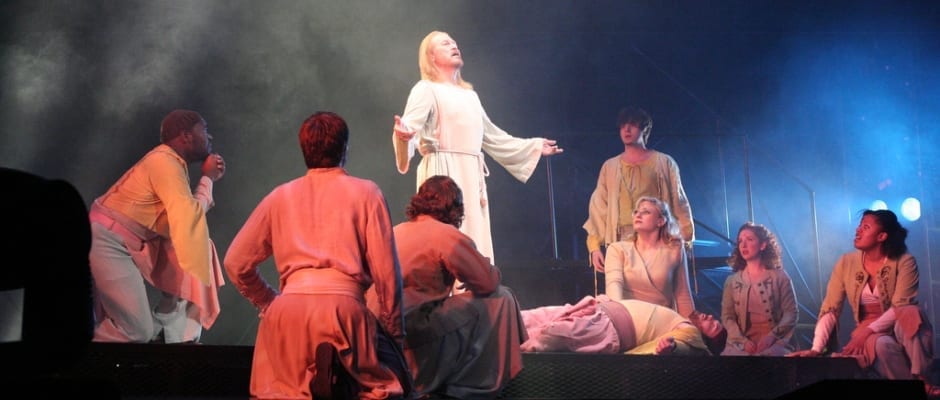
PARK CITY — Historically, Jesus of Nazareth is a polarizing figure. Some see him as a deity; others, as an effective teacher; still others, as a fraud. Whether you believe in Jesus’s divinity or not, he makes for a fascinating character study. Jesus Christ Superstar, with lyrics by Tim Rice and music by Andrew Lloyd Webber, is one such attempt to explore Jesus not only as a character but as a man.
Personally I find Lloyd Webber’s early works to be his strongest: Evita and Superstar are far more interesting to me musically than Cats or The Phantom of the Opera. Superstar’s score is raw, vigorous, and alive. Tim Rice’s straight-forward lyrics dare to ask questions about faith and priorities. Did Jesus do everything he could have for the poor surrounding him? Was it right of him to spend time in the company of sinners and whores? Was he really who he claimed to be? Superstar asks these and other similar questions through the characterization of one of history’s most notorious villains, Judas (played here by Carleton Bluford). One of my favorite aspects of this show is that Judas is given a fair shake: from a dramatic standpoint, we want to see him make the decisions that lead him to betraying his friend and mentor, and not just assume from the beginning that Judas is evil incarnate.
Bluford does a great job bringing complexity and confusion to Judas. His emotional attachment to Jesus is clear, at the same time that I could sense turmoil growing within him. Bluford is likable and charismatic on stage, a definite plus when it comes to playing a fellow with such a bad reputation.
In the role of Jesus is Ted Neeley, who has been connected to Superstar since the early 1970s, when he understudied the title role on Broadway, and then filled it in Norman Jewison’s film version. Neeley’s age adds an interesting fatherly dynamic to his portrayal of Jesus. While I found his acting to be a little wooden, I really enjoyed hearing him sing. He sure can hit those high notes, and this strong ensemble, under the music direction of Jeffrey Price, provides him with ample support.
Kate Smith, in the role of Mary Magdalene, provides another fine performance: “I Don’t Know How to Love Him” is one of my favorite numbers, and Smith’s rendition is lovely and heartbreaking.
A nine-member orchestra provides live accompaniment, directly upstage of the action. While the orchestra sounds fantastic, their presence raises some unfortunate technical difficulties. Superstar is characterized by its creators as a “rock opera,” and most of the communication between characters is either sung or pantomimed. There are a few choice lines that are spoken—the dialogue between Jesus and the Roman prefect Pilate (Randy Barton) comes to mind—that get lost in the flood of music. There are several sung passages key to the plot that are also overwhelmed by the accompaniment; having seen the show before and being familiar with the biblical accounts I didn’t feel lost, but someone without that experience might be.
To hear this cast sing these songs is great fun. The score pulsates, and I found myself watching the heads around me bob in time to the music; I half-expected the audience to get up and dance in the aisles.
But is this is a musical or a concert? The staging of the play (directed by Daniel Simons and choreographed by William Richardson) lacks a bit. This is a show that should pop and crackle, planting the mythical Jesus firmly on the mortal earth. More often than not, I was being told the story of Jesus rather than being shown it: many of the scenes are ironically dry and pageant-like, moving more like medieval paintings than contemporary, living drama.
The show is not without its high points. One of my favorite moments comes late in the first act, when a curious crowd turns into a demanding mob, swirling about Jesus, pulling at him: “Won’t you touch, will you heal me, Christ?” Jesus is almost swept away by force of the mob, and Simons effectively employs a gigantic beggar puppet to tower over Jesus as he sings “There’s too many of you” and “There’s too little of me.” The scene is fresh and theatrical, and I wish there had been more like it throughout the evening.
Another such moment came in the crucifixion scene, fashioned considerably by Joseph Fox’s fine lighting: Neeley’s body, suspended on a cross, looks frail and broken, imaging a carved figure hanging above the altar in a drafty cathedral apse.
We live in a day when the mention of religion can set off tempers, and celebrities are both deified and hounded. Jesus Christ Superstar, with its surging score and clear, emotional libretto is still as sharp and relevant as it was forty years ago. It succeeds dramatically because it’s not about preaching a moral so much as it is about people—about real people making real choices. It’s a powerful work of theatre, and the Egyptian Theatre Company’s current production, despite its flaws, is worth seeing.
[box type=”shadow”]JESUS CHRIST SUPERSTAR plays through December 31st at the Egyptian Theatre located at 328 Main St., Park City. Tickets are $40-70. For more information, visit EgyptianTheatreCompany.org or call 435-645-0671.[/box]

